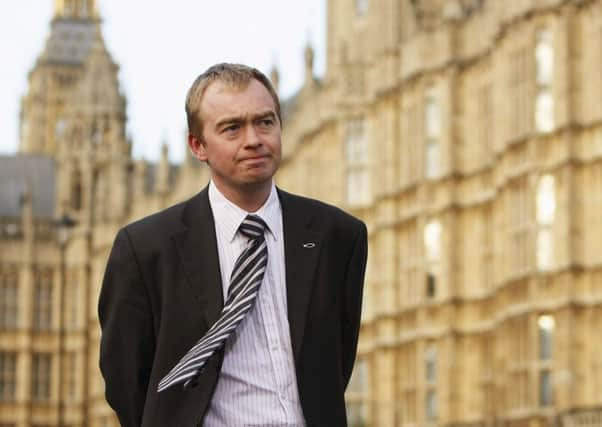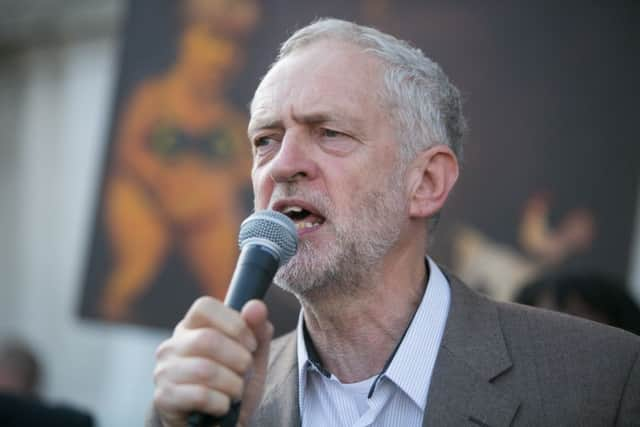Euan McColm: Centre ground is best path for Farron


Tim Farron has just been elected to one of the most unappealing jobs in British politics. His predecessor, Nick Clegg, may have enjoyed real power as Deputy Prime Minister for five years, but the new leader of the Liberal Democrats faces a battle to preserve his party.
Mr Farron takes control of an organisation in the poorest of health. His victory over former coalition minister Norman Lamb in the leadership contest does little more than allow him to begin at rock bottom.
Advertisement
Hide AdAdvertisement
Hide AdThe decision in 2010, under Mr Clegg, to enter into a coalition agreement with the Conservatives had devastating consequences for the Lib Dems. The party now has just eight MPs (and a mere five MSPs). Traditional supporters and those who dabbled, alike, have been unforgiving about the Lib Dem’s deal with the Tories.


When, after years of comfortable and frequently pious opposition, the Lib Dems were challenged to step up and take responsibility, the leadership was willing but the supporters less so.
So, the future for the Lib Dems currently looks bleak and Mr Farron, a former president of the party and likeable enough fellow, has quite the challenge ahead. But there is fertile ground on which the new leader should base his party.
The Labour Party – north and south of the Border – is presently engaged in a righteous (and, I think, idiotic) march to the left. Having been drubbed by David Cameron’s Tories in May’s general election, the party seems to think that what the electorate demands is more unreconstructed socialism of the 1970s variety.
Thus, leadership contender Jeremy Corbyn (a principled guardian of Labour’s traditions or a daft old Trot, depending on your world view) is being talked about as a serious contender to become next leader of the opposition.
And while the UK party dabbles with that particular interesting idea, the party in Scotland seems determined to position itself further left, too; an act that would represent a reaction to the SNP’s words, which are radical and all that sort of thing, rather than its deeds, which remain centrist.
We may, of course, be witnessing a return to an old-fashioned left-right political battle but, if that is so, then history tells us that the left will not win it.
So, assuming that voters remain, at heart, cautious, small c conservative in nature, and self-interested, there is a gap in the market for a party that espouses the rhetoric of what we know as New Labour.
Advertisement
Hide AdAdvertisement
Hide AdThe Lib Dems should seize the opportunity created by the lack of a “third way” voice in politics. This should be done, immediately.
For one thing, the Lib Dems are in such a parlous state that the party simply cannot afford to indulge itself in a period of deep introspection. There are barely enough hands to wring and the new leader should quickly settle on a policy agenda that marks it as a party of the centre.
For another thing, the New Labour project – with its proven track record of success – was pretty Lib Dem, anyway.
Many of former prime minister Tony Blair’s critics, especially those in Labour who will never forgive him for trading their pointless ideological purity for the opportunity to create three successive governments, are fond of levelling the accusation that he was a Tory in a red tie. But wasn’t Blair more like a member of the Social Democratic Party? Wasn’t he more heir to Roy Jenkins – the former Labour MP who helped form the SDP – than heir to Margaret Thatcher?
Those SDP values of social democracy married to support for business that, after a deal was struck with the Liberals in 1988, inform the Lib Dems’ politics also informed Labour’s at its most electorally successful.
Some voters may have, in the past, romanticised the Lib Dems as a party that sat left of New Labour but the reality was that, often, there has been little to differentiate the two parties.
As Labour drifts leftwards into its past and what looks likely to be a prolonged period of unelectability, the Lib Dems should remember the sound ideological principles – principles which Blair wisely purloined – on which their party was founded.
The new leader will, undoubtedly, face questions about the wisdom of the party’s decision to enter into coalition with the Tories five years ago. Those who were most closely involved – Mr Clegg, for example – will hope that the move is defended. They will hope that Mr Farron explains that which the party achieved during its time sharing power.
Advertisement
Hide AdAdvertisement
Hide AdBut, cynical though it may be, Mr Farron should shy away from that sort of thing. Yes, there may be good arguments for the Lib Dems having gone into government (what else were they expected to do?) but there appears to be no gain for the party in trying to persuade anyone that joining the coalition was a display of grown-up politics or that it showed (which it did) that the Lib Dems were prepared not only to talk the talk but to walk the walk, too.
Mr Farron will find this easier than Mr Lamb might have because he managed to avoid holding a government post during he coalition years (though what this says about his political skills may not be especially wonderful).
So Mr Farron enters his period of leadership relatively untainted (though his abstention during a vote on equal marriage continues to raise eyebrows among some in his party and beyond) by the Lib Dems’ recent past. He has a huge task but also, truly, a great opportunity.
The centre ground of politics is looking rather empty just now and there is – I believe – considerable demand for that space to be filled.
Moments after winning the leadership yesterday, Mr Farron tweeted that “Our job now is to turn millions of liberals throughout the UK into Liberal Democrats.”
That suggests he understands the demand for a “third way” voice. Whether he can be that voice, of course, is another matter, entirely.